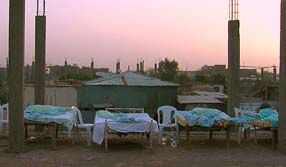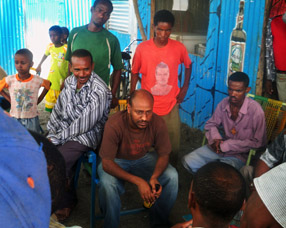Humera, Ethiopia
June 1, 2009
Producer Eli Cane writes from the field.
I’m sitting on the roof of my hotel at sunset in Humera, sweating. The temperature is dropping, but it’s still up around 115 degrees. It peaked earlier today at around 125, when we were in the middle of a parched sesame field getting shots of gojo bets (traditional family huts) and watching the heat shimmer its way up from the cracked black earth.

Wicker cots on the roof in Humera |
By nightfall, the temperature should dip to a refreshing 90 degrees — with a breeze, thankfully — and we’ll line up our wicker cots side-by-side on the roof to sleep. We’ll share this makeshift open-air bedroom with Ben Aschenaki, head of business development for the Ethiopia Commodity Exchange.
Humera is in the northwest corner of Ethiopia, on the border with Sudan and Eritrea. The borders are closed here, but you can still feel a certain tension in the air. Ethiopia and Eritrea have fought two wars in the past century, and Ethiopia and Sudan had their own border dispute in 2003. The most popular accessory around here is a Kalashnikov. We’ve come to catch up with Ben and his team, some of whom have been here for a few weeks meeting with farmers, agricultural societies, cooperative unions, and commercial farmers, and trying to convince them to deposit their sesame into the recently opened ECX warehouse.

Ben Aschenaki meeting with traders in Humera, Ethiopia’s sesame capital |
Sesame is Ethiopia’s rising export star — production has grown by more than 200 percent in export value in the last few years, and Ethiopia now sends vast quantities to India, China and the Middle East. In part because coffee exports are down, some are saying that sesame will surpass coffee as Ethiopia’s biggest export commodity in 2009. Despite its inhospitable climate, Humera produces some of the finest sesame in the world.
We arrived yesterday, just in time to see a small farmer chugging his way into the ECX warehouse on an old rusty tractor to make the first deposit. Ben and his team were elated; until now, they’d met with fierce resistance and mistrust, as the sesame community was understandably skeptical of a major new player moving into their market. The first deposit is monitored by local observers who closely watch the ECX’s modern grading and receipt systems. Ben tells us that this is a major breakthrough for the ECX and sesame farmers. If the team back in Addis can arrange to launch sesame trading by the end of the week, these farmers will have money in their bank accounts by next week. This is just a small start, but a symbol of bigger things to come.
